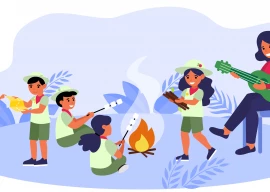
Eight months after the floods forced Saleemullah Adeel and his family to abandon their home in Muzaffargarh, the road to recovery has proved rough for the landless farmer and scores of others like him.
“We have not survived the floods. We are still surviving it. People seem to think we have dealt with it and it is all over. They are wrong,” Adeel said. He said that the wheat he planted on 10 acres (four hectares) leased from a large landowner at an annual fee of US$118 per acre was currently his only means to rebuild. Saleemullah hopes for a good crop this year because weather conditions have been good but he fears that the floods will return.
“For those of us who lost everything, our greatest fear is that it will happen again and we will lose everything all over again,” Adeel said. He said that his house had been partially repaired and that he had taken up farming on a small patch of land. Other than that, Adeel said there was little else to be happy about. “I bought wheat seed and fertiliser after selling the jewelry we had purchased for my elder daughter’s wedding,” he said, adding “the wedding would have taken place this month if it weren’t for the floods.” “Now it has been postponed and I have used up all my savings and those of my two sons. They used to work on fish farms and have lost their jobs,” he said.
The 2010 floods destroyed hundreds of fish farms in the Muzaffargarh area, according to media reports, leaving many, like Saleemullah’s sons, out of work. The biggest problem for people like Adeel has involved land. Since he did not own the land he farmed, he was not awarded compensation by the provincial government, which gave landowners seed and fertiliser. “The landlord we lease from claimed he needed [the seed and fertiliser] for his own lands,” he said.
“I have earned nothing for months because the cotton crop was destroyed. Factories which crush the cotton seed to extract oil did not employ us this time as they usually do,” said Ahsan Akhtar, 30, whose wife was not hired as a cotton-picker this year. Akhtar said that another major problem in the flood zones was education and infrastructure. “There were few schools to begin with and now there is nothing. I fear that my children will miss out on years of education and never be able to catch up,” he said.
Across the country, people have continued to live with losses incurred during the floods and it is becoming increasingly hard to recover. “My youngest child, aged six months, has had diarrhea for nearly a month,” said Sanober Bibi, 25.
“The health workers who used to visit early on after the floods no longer come here. We are out of medicine and infections are spreading at a rapid rate, she said.” Sanober said that there was no clinic in their village.
On April 6, UK Charity Oxfam country director Neva Khan pointed fingers at the government, telling reporters that the delay on part of the government to draft a feasible reconstruction strategy had resulted in delays in urgent rebuilding and recovery efforts. “There are places where reconstruction work hasn’t even started and it’s been eight months,” she said.
National Disaster Management Authority spokesperson Ahmed Kamal refuted this claim saying “The rehabilitation phase was started some months ago and we have not left any place behind.” A Sindh government official, who preferred anonymity, said a “desperate lack of funds” was holding up recovery in the province.
Last year, the change in legislation involving many duties previously being performed by the federal government now being devolved to provinces has caused complications. Many people in Khyber Pakhtunkhwa and Balochistan still require aid workers and health care.
According to a survey conducted for Oxfam by the Pakistani NGO Free and Fair Election Network, 70 per cent of flood-affected people are also seeking jobs. “People want jobs, not handouts,” Khan added.
On March 31, the UN Office for the Coordination of Humanitarian Affairs (OCHA) said the floods, which affected more than 18 million people, had left behind a wave of sickness and destruction that still hadn’t receded, even after the water dried up.
An OCHA fact sheet said shelter and clean drinking water were still required and many were also still suffering from diseases.
In many flood-hit areas, pools of water have gathered in low-lying areas and there are several swamps. “This adds to the spread of disease, and dirty water sometimes contaminates clean supplies used for drinking purposes,” Rafia Ali, a doctor, said.
“Reminders of the floods have vanished off TV screens. This has taken the issue out of the public consciousness and people are beginning to forget. We need to remind them again that this disaster is still present,” Ali said.
Ibrahim Mughul, chairman of Pakistan’s Agriculture Council, said “The agricultural losses caused by the floods were devastating. Recovery will take a long time”.
Published in The Express Tribune, April 9th, 2011.

















COMMENTS
Comments are moderated and generally will be posted if they are on-topic and not abusive.
For more information, please see our Comments FAQ